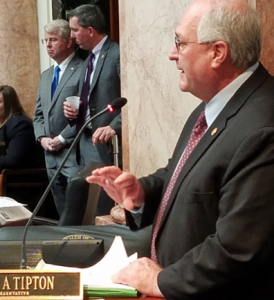By Tom Latek
Kentucky Today
Legislation that would require all voters to show a photo ID when arriving at the polls to vote won House approval on Tuesday after several changes were made to the Senate’s original version.
Rep. James Tipton, R-Taylorsville, presented the bill to his colleagues, beginning with an amendment. He told his colleagues the old method of allowing someone to vote without showing ID as long as they were personally known to the poll workers, would be kept but with one change.

“The election officer would have to execute an affirmation, attesting to personally knowing the voter,” he said. There were also other provisions, limiting provisional ballots to federal elections and how someone could vote without a photo ID, by demonstrating an impediment to getting one.
“The amendment came about as a result of a long discussion with new Secretary of State Michael Adams and the county clerks, and I have a letter from the county clerks’ association, saying they are supportive of this amendment and the bill.”
Tipton noted Adams ran last year on a platform of implementing a voter photo ID law, “And he was awarded with a victory in that election.”
In presenting the bill, Tipton also stated there are many things you need a photo ID bill for on a daily basis.
“To cash a paycheck, open a bank account, go to the doctor, pick up UK or U of L tickets. We should also need a photo ID to vote, like our neighboring states.
“This will change nothing for the 98 percent of voters who already use a photo ID. Under this bill, any individual who will be 18 years of age as of the next general election and does not have a driver’s license or commercial driver’s license, can walk right into their circuit clerk’s office and get a photo ID free of charge.”
Virtually everyone who spoke after Tipton did so in opposition.
Among them, Rep. Mary Lou Marzian, D-Louisville.
“We have a voter turnout problem in this state where we celebrate if we get 30 percent of the voters to show up. This is a blatant attempt to suppress voters: women who change their names, minorities, the elderly, the disabled.”
The bill passed 62-35, mostly along party lines, and because of the House amendment returns to the Senate for them to decide whether or not to agree to the changes.

















